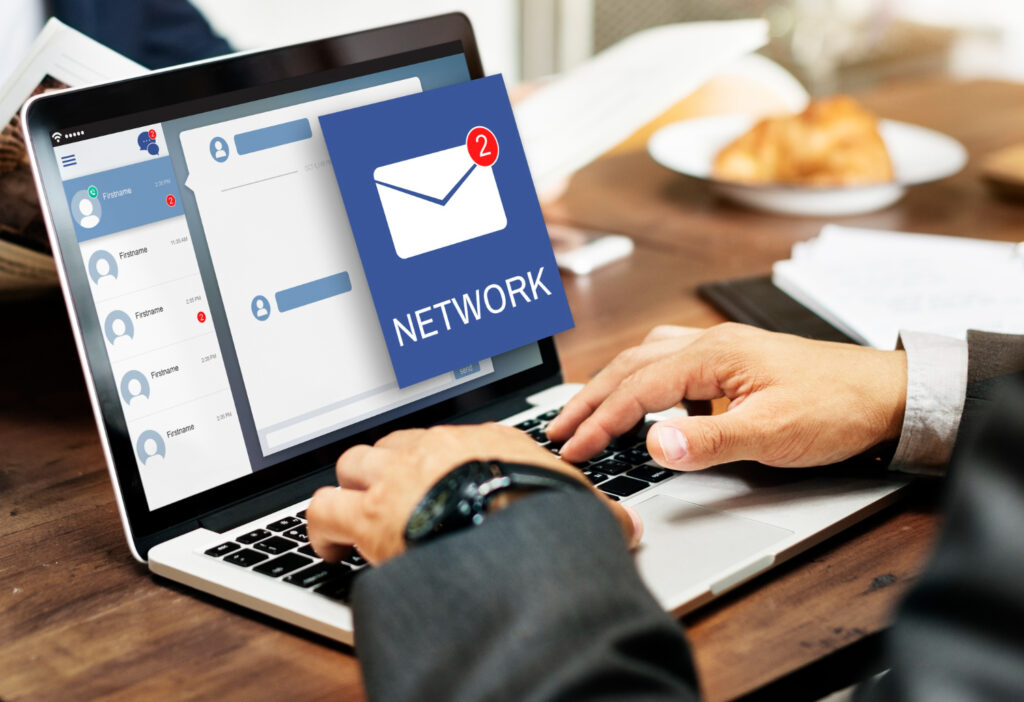Think email is old-school? Think again. In the fast-paced digital world of 2025, email remains one of the most powerful tools for communication, collaboration, and connection. Whether you’re working from a remote village or managing a global business, email is still the digital glue holding professional and personal worlds together.
In this blog post, we’ll uncover the importance of email in today’s era, analyze its applications, understand how it continues to evolve, and reveal why email still reigns despite the rise of instant messaging and social media.
1. The Evolution of Email
1.1 From Inbox to Everything
Email started as a simple tool to send text messages electronically. Over time, it evolved to include multimedia, cloud integration, and automation — becoming an indispensable part of our lives.
1.2 Email Through the Decades
From AOL to Gmail, and from Hotmail to Outlook — the journey of email is fascinating. It adapted, integrated with mobile, and even survived the messaging app explosion.
2. Email vs Instant Messaging: Who Wins?
2.1 Reliability and Formality
While messaging apps are quick and casual, email provides a reliable and formal communication medium — perfect for work, contracts, legal matters, and professional networking.
2.2 The Professional Edge
In a world where emojis dominate chats, email’s structure and tone give it an unmatched professional edge, especially for resumes, pitches, and collaborations.
3. Why Email Remains the King of Business Communication
3.1 Universal Acceptance
Whether you’re contacting a CEO, a university, or a government body — email is the default. It’s globally accepted, making it essential for formal communication.
3.2 Clear, Documented, and Searchable
Unlike chats, emails can be archived, searched, and tracked. That’s gold for audits, follow-ups, or retrieving lost threads.
🔑 Key Point 1:
Email provides structured, universal, and legally viable communication — unmatched by chats or social media platforms.
4. The Role of Email in Remote Work
4.1 Keeping Distributed Teams Aligned
Remote teams rely heavily on emails for documentation, meeting invites, summaries, and long-form updates.
4.2 Asynchronous Communication
Email allows team members across time zones to stay in sync without needing to be online at the same time.
5. Email and Digital Marketing
5.1 The Most Profitable Channel
Email marketing still has one of the highest ROI of all digital channels. Personalized newsletters and campaigns build loyalty and drive sales.
5.2 Building Trust and Branding
Brands use email to inform, educate, and nurture leads. Unlike ads, email lands directly in someone’s personal space — their inbox.
6. Personal Productivity and Email
6.1 Task Management via Email
Many users treat their inbox as a productivity hub. From flags and filters to starred messages and integrated calendars, emails streamline workflow.
6.2 Email and Focus
Unlike noisy messaging platforms, email reduces distractions. It encourages thoughtful, focused communication.
🔑 Key Point 2:
Email supports productivity, asynchronous communication, and long-term record keeping — essential in both personal and professional life.
7. Email as a Digital Identity
7.1 Email for All Accounts
From social media logins to online banking — your email is the digital key to nearly every service.
7.2 Verification and Security
Most services rely on email verification. It acts as your identity proof in the digital universe.
8. Email and Educational Institutions
8.1 Academic Communication
Professors, students, researchers — all use email for assignments, research submissions, and collaborations.
8.2 Institutional Announcements
Schools and colleges still prefer email for formal notices, event invites, and policy updates.
9. Security and Privacy in Email
9.1 Encryption and Control
Unlike most messaging apps, email offers end-to-end encryption and enterprise-level controls. Perfect for confidential communication.
9.2 Spam and Phishing Protection
Modern email clients filter spam and warn against suspicious messages, keeping users safe from cyber threats.
🔑 Key Point 3:
Your email address is your digital passport, providing security, access, and traceability across platforms and services.
10. Email in Customer Service
10.1 Customer Support Channels
Companies still use email to respond to service queries, raise tickets, and offer detailed responses.
10.2 Complaint Handling
Unlike chatbots, emails offer human escalation and complete communication threads for effective issue resolution.
11. Email Etiquette in the Modern Age
11.1 Professional Standards
Knowing how to craft a clean, polite, and direct email remains a fundamental skill in the professional world.
11.2 Reply Timing and Tone
Prompt responses and a professional tone build trust and foster better working relationships.
12. Role of AI and Automation in Email
12.1 Smart Replies and Scheduling
Gmail and Outlook now offer smart replies, predictive typing, and send-later features to boost productivity.
12.2 Email Bots and CRM
Sales and support teams use AI email bots to send follow-ups, reminders, or auto-responses — saving tons of manual effort.
🔑 Key Point 4:
AI is transforming how we use email, making it more intelligent, contextual, and efficient without losing its essence.
13. Email in Legal and Governmental Processes
13.1 Official Communication
Government agencies still depend on emails for issuing notices, legal documents, and RTI replies.
13.2 Evidence in Court
Email communication is admissible in legal proceedings, thanks to its timestamped and uneditable nature.
14. Managing Email Overload
14.1 Inbox Zero Techniques
From filtering to folders, many techniques like “Inbox Zero” help users stay organized and avoid email fatigue.
14.2 Unsubscribe and Prioritize
Tools like Unroll.me and built-in unsubscribe links help clean out non-essential emails.
15. Email in Nonprofits and NGOs
15.1 Volunteer Coordination
Email remains the backbone for coordinating volunteers, donors, and event updates for NGOs.
15.2 Donation Campaigns
Emails offer a low-cost, wide-reaching tool for fundraising and cause awareness campaigns.
🔑 Key Point 5:
No other tool offers the reach, traceability, and professionalism that email does — making it essential even for social causes.
16. The Future of Email
16.1 Integration with Apps
Email is evolving to become a dashboard — integrated with calendars, to-do lists, CRMs, and project managers.
16.2 Privacy-First Platforms
Services like ProtonMail and Zoho Mail are leading the privacy revolution in email, giving users control over their data.
17. Email for Networking and Job Hunting
17.1 Resume and Cover Letter Tool
Job seekers use email to apply, follow up, and network with recruiters or HR professionals.
17.2 Professional Introductions
Cold emailing remains a powerful tool to build professional connections or get mentorship.
18. Multilingual Communication via Email
18.1 Breaking Language Barriers
Emails can be easily translated, enabling seamless cross-border communication in multiple languages.
18.2 Accessibility and Inclusion
With screen readers, font settings, and simplicity — email remains accessible for people with disabilities.
19. The Power of Newsletters
19.1 Curated Content Delivery
Newsletters allow creators and businesses to deliver valuable content directly into the subscriber’s inbox — no algorithm interference.
19.2 Monetization
Platforms like Substack and ConvertKit have turned email into a profitable content channel for writers and educators.
20. Final Thoughts: Email Is Here to Stay
20.1 Timeless and Evolving
Despite being around for decades, email is far from outdated. It’s evolving, adapting, and continuing to dominate digital communication.
20.2 Make the Most of It
Learn email etiquette, use automation tools, and keep your inbox clean — because email is still the most critical communication tool you have.
FAQs on Importance of Email in Today’s Era
- Why is email still important today?
Email offers professional, secure, and documented communication — essential in both work and personal life. - How is email different from chat apps?
Email provides formality, traceability, and better documentation compared to instant messaging. - Is email used for marketing in 2025?
Absolutely! Email marketing remains one of the most cost-effective channels for businesses. - Can emails be used as legal evidence?
Yes, emails with timestamps are admissible in court and legal processes. - How can I reduce email overload?
Use folders, unsubscribe from spam, and adopt inbox management tools like filters and rules. - Are emails secure for sensitive information?
Encrypted email platforms like ProtonMail offer enhanced privacy for sensitive data. - Is email still relevant for job applications?
Yes, email is the primary channel for submitting resumes, cover letters, and job inquiries. - What is email etiquette?
It includes proper greetings, clear subject lines, concise messages, and professional tone. - How is email used in schools and universities?
It’s the go-to tool for official communication, assignments, and announcements. - What is the future of email?
Integration with AI, automation, and privacy-first solutions are shaping the future of email.





